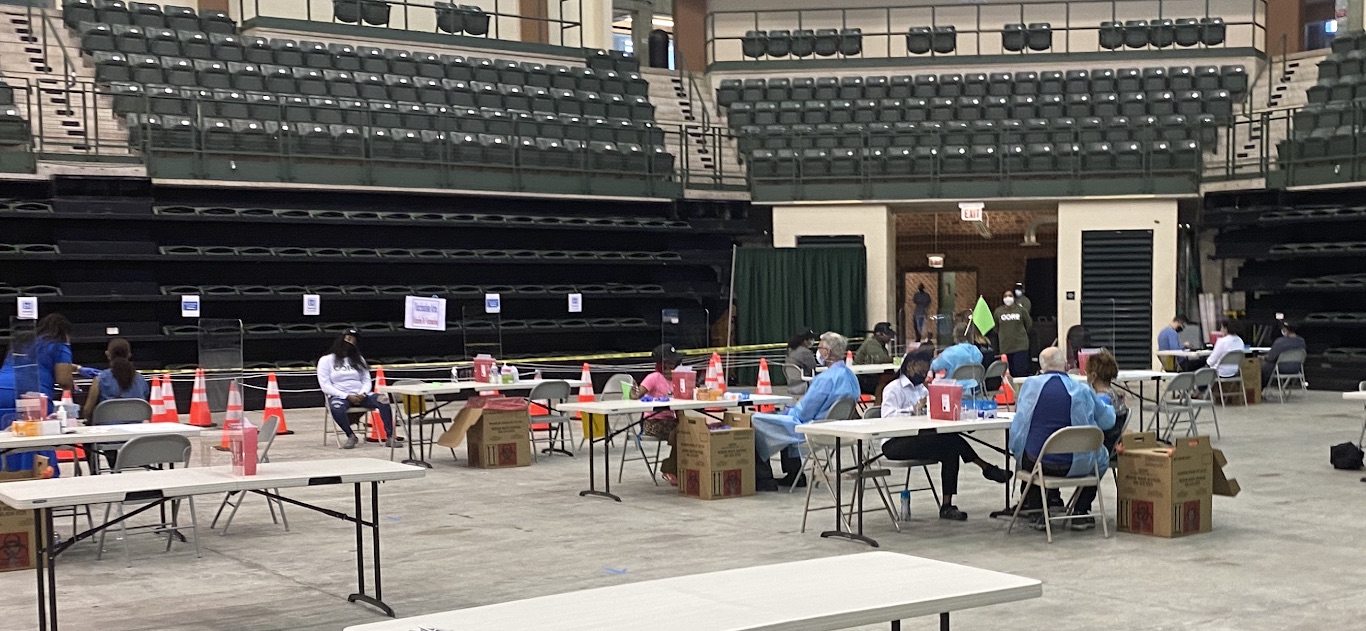The mass vaccination site at Chicago State University will now offer the two-shot Pfizer vaccine after several blood clot cases forced U.S. federal regulators to temporarily suspend inoculations using the Johnson & Johnson vaccine on Tuesday, April 13.
Health officials said the pause is expected to last several days. It is unclear when Chicago State will resume administering the Johnson & Johnson vaccine.
The suspension is a disappointment to many South Side residents, who viewed the Johnson & Johnson vaccine as a convenient dose, requiring only one trip to Chicago State.
Dr. Allison Arwady, commissioner of the Chicago Department of Public Health said about 47,000 Chicago residents have received the single-dose Johnson & Johnson vaccine. About 290,615 Illinois residents have received the Johnson & Johnson vaccine, and as of April 12, more than 6.8 million doses of the Johnson & Johnson vaccine have been administered in the U.S.
In a news release, the State of Illinois identified the “vast majority” of vaccines being administered in Illinois were developed by Moderna and Pfizer. Of the allocation for this week, only 17,000 doses were Johnson & Johnson. For next week, the state said it expects to receive 483,720 total doses of COVID-19 vaccine, of which 5,800 doses are expected to be Johnson & Johnson.
The mass vaccination site at Chicago State had been administering the Johnson & Johnson vaccine since the site opened April 5. Last week, the vaccination site was closed two days––Tuesday and Thursday because city officials said the site suffered from staff and vaccine shortages.
The United Center mass vaccination site was scheduled to begin administering the Johnson & Johnson vaccine on April 12. The site had been administering the Pfizer vaccine before demands grew for the single-dose Johnson & Johnson vaccine.
On the North Side, the mass vaccination site near Wrigley Field had also been administering doses of the Johnson & Johnson vaccine.
Arwady said Chicago State will switch to the Pfizer vaccine, and those with existing appointments, do not have to cancel them.
“We don’t have vaccine sitting on shelves; we push it all out,” Arwady said. “But I’m really committed, particularly to that Chicago State site because it’s on the Far South Side—one of the regions where we’re seeing slower vaccination uptake.”
Next week, Governor J.B. Pritzker will ship 50,000 first doses of Pfizer and Moderna to Chicago to fill the void left by the Johnson & Johnson vaccine. Later, Pritzker will allocate another 50,000 second doses to Chicago for the people who receive those first inoculations.
“As cases climb across the country, I encourage everyone to get vaccinated as soon as possible,” Pritzker said in a tweet.
In a joint statement Tuesday, the U.S. Centers for Disease Control and Prevention and the Federal Drug Administration said they are reviewing data involving six reported U.S. cases of a rare and severe type of blood clot that developed in individuals after receiving the Johnson & Johnson vaccine.
In these cases, a type of blood clot called cerebral venous sinus thrombosis was seen, in combination with low levels of blood platelets. All six cases occurred among women between the ages of 18 and 48, and symptoms occurred six to 13 days after vaccination.
Health officials said treatment of this specific type of blood clot is different from the treatment that might typically be administered. Usually, an anticoagulant drug called heparin is used to treat blood clots. In this setting, administration of heparin may be dangerous, and alternative treatments need to be given.
On April 14, the CDC was scheduled to meet with the Advisory Committee on Immunization Practices (ACIP) to further review these cases and assess their potential significance. The FDA will review that analysis as it also investigates these cases.
“Until that process is complete, we are recommending a pause in the use of this vaccine out of an abundance of caution,” the CDC and FDA jointly explained.
“This is important, in part, to ensure that the health care provider community is aware of the potential for these adverse events and can plan for proper recognition and management due to the unique treatment required with this type of blood clot.
“Right now, these adverse events appear to be extremely rare. COVID-19 vaccine safety is a top priority for the federal government, and we take all reports of health problems following COVID-19 vaccination very seriously. People who have received the J&J vaccine, who develop severe headache, abdominal pain, leg pain, or shortness of breath within three weeks after vaccination should contact their health care provider.”






